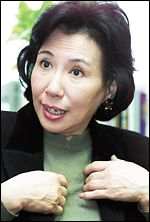This is the first in what I hope to be a continuing summary of Japanese politics, providing links, pictures and commentary from one foreign enthusiast to another. The category is entitled Doozo Yoroshiku, after the traditional political greeting yelled - usually through bullhorns - by political campaign aides for their smiling, white-gloved candidates. It's my hope that Japan's politics are as delightful as its cultural idiosyncracies, and that readers will find this informative as much as enjoyable. So, then, Doozo Yoroshiku, and read on.

Meet Makiko Tanaka, Japanese political femme fatale. Appointed to Foreign Minister by newly elected Prime Minister Junichiro Koizumi in 2001, she soon departed, apparently over strong policy differences. Last year she left the Diet under the cloud of a secretary-payroll scandal. She was absolved, vowing not long after to return to Tokyo politics. The Liberal Democratic Party (LDP) oldhand was offered a place in the ranks of the Democratic Party of Japan (DPJ) as they mounted their challenge against the historically unassailable LDP, but she deferred to her own name-recognition and prowess, boasting of a triumphant reentrance into the Diet. She ran as an independent and won two weeks ago, but not before somewhat outrageously suggesting that children of Japanese abducted by the North Koreans are instead extranationals. If you want eye-raising political misadventures, keep an eye on this fine, young lady.
Though skeptics don't believe substantial gains by the Democratic Party of Japan pose any threat to the LDP's Diet authority, a sizable minority party has quite a bit of potential to shake up regular business in Tokyo. And optimists see the challenge on Japan's grandfathered political establishment as anything from the beginning of a stable, two-party system to a rebirth of public officals' accountability on specific matters of policy.
Grand prize if you can spot a Mainichi dispatch about Iraq that doesn't describe it as "war-torn." But a rather uncertain gamble is how the rebuilding country is seen to Japan's chatterers, and Tokyo has been dithering for a few months now, not at all helped by the strengthened opposition party's - the DPJ's - rejection of military aid. Even so, a military survey team left for Iraq a week ago with the intention of devising an eventual deployment strategy - one that at least has notable support from the LDP as recently as September.
(Is it me, or is the irony of Japan's military being named the SDF just too much? If you agree, write to a representative and tell the Diet to fund house-sized, flying, transforming robots.)
But at least the Japanese are moving in one smart direction: they're cutting funding to drainpipes otherwise known as international, pseudo-governmental organizations. They pay their fair share, and then some: the next time someone credits the "United Nations" for a logistical accomplishment, remember that fifty cents out of every dollar came from the United States and Japan.
No good reform goes unpunished - that's the message for Prime Minister Koizumi as he zeroes in on fiscal decentralization, one of his promised reforms, against an entrenched bureacracy. A separation of powers - especially in terms of taxation and redistribution - is for certain good, as Japan needs all the federalist reforms it can get, so it's hoped that Koizumi can help unwind the red tape. Indeed, Koizumi the public chastener faces near-equal and opposite reaction wherever he goes.
